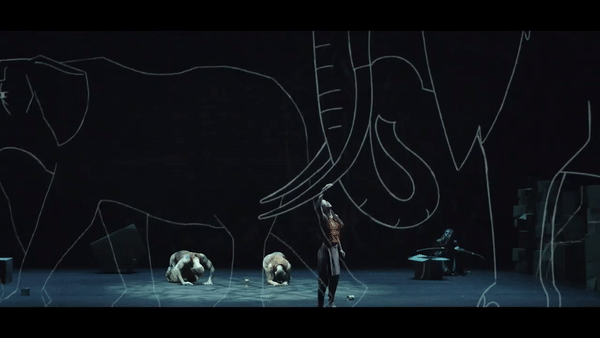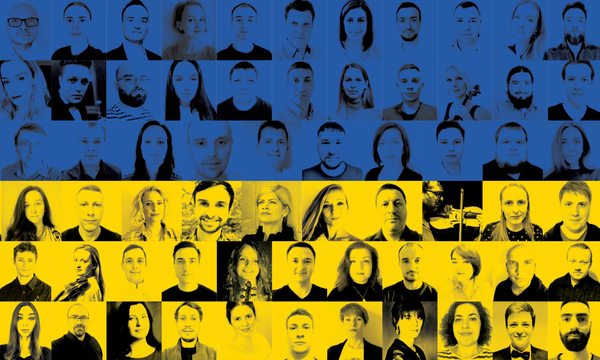
News Story
This summer, our Festival programme is packed with adaptations of works by major literary heavyweights. Bestselling contemporary blockbusters and beloved fairy tales alike have been reimagined as plays, operas, symphonies and choral compositions by some of the world’s most exciting artists. If you just can’t wait until August, we’ve put together a reading list of the literature behind the performances coming to Edinburgh stages this summer, covering everything from short stories for your lunch break, to long reads to get lost in for weeks.
A Little Life by Hanya Yanagihara
Wasn’t friendship its own miracle, the finding of another person who made the entire lonely world seem somehow less lonely?Hanya Yanagihara

A Little Life
© Jan VersweyveldA book of epic proportions, this 700-page modern classic follows four central characters, Jude, Willem, J.B. and Malcolm, as their lives interweave over several decades in New York City. Exploring themes of male relationships, trauma, abuse and recovery, this gruelling, heartbreaking read has nonetheless found a place in the hearts of millions of book lovers worldwide, gathering rave reviews from critics along the way. When Ivo van Hove approached Hanya Yanagihara about staging A Little Life, she said she felt ‘honoured’ to have the director adapt her novel and was in consultation with him throughout the writing process. ‘The book requires total surrender from the reader,’ she said, ‘And it will be the same with the play.’
Walking with Ghosts: A memoirby Gabriel Byrne
I carry that day like a photograph in my heart.Gabriel Byrne
A meditation on the workings of memory, Gabriel Byrne’s Walking with Ghosts is far from your usual celebrity memoir. Finished in early 2020, Walking with Ghosts is as much an act of self-exploration for Byrne himself as it is an act of discovery for the reader. The book focuses largely on what it means to be an Irish exile; to feel a sense of non-belonging in any place, with Byrne saying ‘it’s only lately that I have begun to reconcile myself to Ireland, and to myself when I left there. That has not been completely healed.’ The book is written in vignettes, flitting back and forth between different periods of time and different places, from his Catholic, working-class upbringing in the urban outskirts of Dublin to drinking with Richard Burton in Hollywood. This deceptively random structure is strategic on Byrne’s part, reflecting his desire to ‘capture how memory actually works’. Weaving a tale that travels from starstruck highs to poignant lows in the space of a chapter, Byrne is revealed as a master storyteller both on stage and on the page.
Landmark Production’s production of Walking with Ghosts is at the King’s Theatre from 24–28 August.
Never had she danced so beautifully; the sharp knives cut her feet, but she did not feel it, for the pain in her heart was far greater.Hans Christian Anderson
The story of Antonín Dvořák’s Rusalka has been traced back to both Danish and French fairy tales about a water sprite who falls hopelessly in love with a human man: Undine and The Little Mermaid. It has the most elements in common with the latter, both featuring an evil sorceress who persuades the innocent heroine to exchange their voice for a chance at love – although Anderson includes a heavily moralistic ending that both Dvořák and, years later, Disney chose to avoid. The mystical, atmospheric world of the traditional tales provide ample inspiration for Rusalka’s shimmering score and enchanting woodland staging. Welsh rising star Natalya Romaniw takes on the title role in this summer’s Rusalka, staged as a co-production with Garsington Opera.
The Jungle Book by Rudyard Kipling
The reason the beasts give among themselves is that Man is the weakest and most defenceless of all living things.Rudyard Kipling

Jungle Book reimagined
© 2022 Maxime DosThe Jungle Book, best-known to many as an animated or live-action Disney film, was originally published by Rudyard Kipling as seven short stories between 1893–94. Written for his daughter, Josephine, and originally illustrated by his father, the tales draw on Kipling’s early life in colonial India. A memorable cast of panthers, bears, elephants, pythons and tigers all join the adventures of the central character Mowgli, a boy who was raised by wolves and lives in the jungle. Choreographer Akram Khan has a long history with the work, having played the role of Mowgli aged 10, but his company’s new adaptation reimagines the story in a contemporary setting. ‘I wanted to tackle The Jungle Book from my perspective, rather than Kipling’s’, he told the Guardian. ‘We can’t ignore that he was a racist and an imperialist, but it doesn’t take away from the fact that the story was something that I connected with.’
La Belle au Bois Dormant (The Sleeping Beauty) by Charles Perrault
The god of marriage oaths has promised this: The love that comes most slowly, longest stays.Charles Perrault
The story of La Belle au bois dormant, or The Sleeping Beauty, has provided inspiration for countless works of art. When Tchaikovsky came to compose his Sleeping Beauty ballet score, he looked to French author Charles Perrault’s version. Perrault’s tale of a princess cursed at her christening by an evil fairy drew extensively from earlier versions, particularly Giambattista Basile’s 1634 Sun, Moon and Talia, but removed some of the more unsettling parts of the older work. His changes formed the basis of the story we know today, introducing a handsome prince to find the princess rather than Basile’s married king – and removing a particularly disturbing section in which the princess gives birth while still unconscious. The enchanting elements of Perrault’s fairy tale transfer into Tchaikovsky’s composition, creating an at turns dramatic, romantic and spellbinding ballet score.
The End of Eddy by Édouard Louis, translated by Michael Lucey
Every morning in the bathroom I would repeat the same phrase to myself over and over again . . . Today I’m really gonna be a tough guy.Édouard Louis

The End of Eddy
© 2020 Sanne PeperThe most recent book on our list, The End of Eddy is a moving coming-of-age novel about a boy growing up gay in a village in northern France in the 1990s and 2000s. At only 192 pages, the book is a small yet powerful depiction of poverty, sexuality and violence in rural France. Inspired by Louis’s own childhood, it has had a huge cultural and political impact and received rave reviews across the board, with the Guardian dubbing it ‘essential reading’. For those who want a deeper dive into the story, Louis’s memoir, Who Killed My Father, looks at key moments in his father’s life and explores their relationship in only 82 pages.
Toneelschuur Producties’s production of The End of Eddy is at Church Hill Theatre from 19–21 August.
Salome by Oscar Wilde
Neither at things, nor at people should one look. Only in mirrors should one look, for mirrors do but show us masks.Oscar Wilde
A rare tragedy from Oscar Wilde, Salome is a one-act play originally published in French, which was later translated into a German libretto for Strauss’s opera. The play famously fell foul of the Lord Chamberlain’s censorship rules, which banned a London premiere planned for 1893. Narrating Salome’s attempted seduction of John the Baptist, the play was deemed too scandalous for the British public – an official in the Lord Chamberlain’s office described it as ‘half Biblical, half pornographic’. It was first performed in Paris in 1896, but was not allowed to be staged publicly in Britain until 1931, over three decades after Wilde’s death. Depicting incredibly dark events through beautifully poetic language, the play remains a fascinating contradiction that is well worth reading today.
Macbeth by William Shakespeare
Double, double toil and trouble; Fire burn and caldron bubble.William Shakespeare
Shakespeare’s tale of ambition, treachery and tyranny in mediaeval Scotland has captivated audiences since 1623. Known to the superstitious only as ‘the Scottish play’, it seems only right that Macbeth has appeared regularly at the Festival over the years in a variety of formats. Verdi’s operatic take on the tale was included at the very first Festival in 1947, while theatrical stagings have included a promenade performance on Inchcomb Island in 1989 and an immersive production set in contemporary Iraq in 2012. This year, some of the most famous lines of the play – the witches’ spell, Toil and Trouble – feature in our BBC Singers concert, set to music by Norwegian composer Cecilie Ore.
BBC Singers perform at The Queen’s Hall on Tuesday 9 August.
Which of these books is heading to the top of your reading list? If you read any of these before this year’s Festival, we’d love to hear about it! Share with us on Twitter and Instagram at @edintfest or using the hashtag #edintfest.


